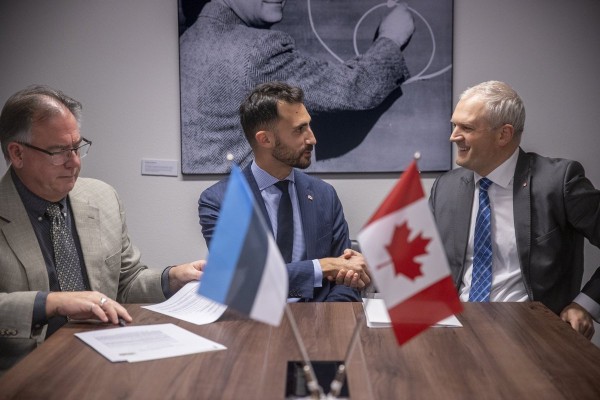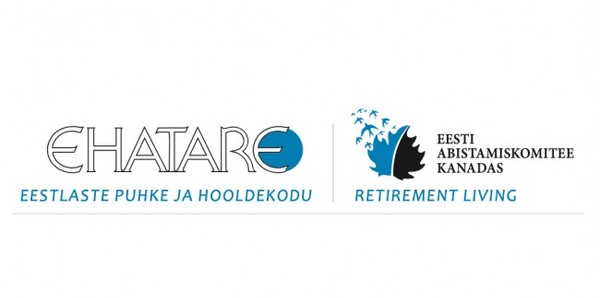Sulev Vedler, Re:Baltica, via BAFL
In August of 1939, the foreign minister of the former Soviet Union, Vyacheslav Molotov and his German colleague Joachim von Ribbentropp signed the infamous treaty of non-aggression between the Soviet Union and Germany. With an additional secret protocol, they divided Eastern Europe into spheres of influence. Estonia, Latvia and most of Lithuania were in the Russian sphere, which allowed the Soviet army to occupy these countries.
Seventy three years later, Molotov's grandchild, Vyacheslav Nikonov, who used to be an aid to the KGB's last chairman, works as the executive director of Russkiy Mir fund. Established by the Russian President Vladimir Putin in 2007, the foundation is established to “promote the Russian language, as Russia's national heritage and a significant aspect of Russian and world culture, and support Russian language teaching programs abroad.”
In 2008, the Russian Foreign Minister Sergey Lavrov, who serves on the board of Russkiy Mir, announced that Moscow would employ “soft power” to influence the behavior of foreign countries and Russian compatriots living abroad. Political scientists define “soft power” as the use of culture and PR as a foreign policy tool instead of crude power and violence.
The Russian state earmarked 1 billion rubles (about EUR 26 million) to the Russkiy Mir Foundation for the first two years of operations (2007-2008). Trying to get more recent numbers from Russkiy Mir itself was not successful—the foundation did not return repeated phone and email inquiries by Re:Baltica.
The foundation presents itself as a Western philanthropic institution: the funding is earmarked through competition. However, Re:Baltica found consistent and significant lack of transparency in the foundation's operations. The annual reports issued by the foundation do not disclose what amounts were granted to which organizations, for example. It only states that over four years of operations, grants were made to over 800 projects in European countries, Russia and other CIS countries.
The Foundation’s board of trustees is chaired by Lyudmila Verbitskaya, the Rector of St. Petersburg State University and the Chair of the International Association of Russian Language and Literature Teachers. Among other trustees of the fund are Vladimir Yakunin, a close friend of Vladimir Putin and the head of the Railroad state company (RZD), and Sergey Lavrov, Russia’s foreign minister.
Both boards of trustees and directors must be approved by the president of Russia.
In 2009, Russkiy Mir financed a study titled: “The creation of conditions for supporting continued education in the Russian language in Estonia through the implementation and use of European anti-discrimination principles.” Carried out by the Legal Information Center for the Human Rights in Tallinn, the study became one of the cornerstones in the fight to resist partial instruction in Estonian in Russian-speaking high schools. Aleksei Semyonov, the director of the Center announced the action plan, including a hotline for collecting complaints and counseling teachers. The Center also conducted a small survey among Russian-speaking teachers and parents, according to which most of the respondents were against such school reform.
By late 2011, the non-governmental organization (NGO) “Russian School in Estonia” (Vene Kool Eestis) had collected over 13,000 signatures against government's plans to start teaching at least 60 percent of all subjects in Estonian in all high schools.
36-year-old activist and resident of Tallinn Alisa Blintsova opposes such a plan.
She sits on the board of the Russian School in Estonia. Blintsova has a doctorate in political science, and works as a lawyer. She can write well in Estonian. Speaking is harder, because during the Soviet times, when she went to school, Russians didn't need to learn or speak Estonian. Blintsova is a mother of two daughters. Her older daughter studied in both Estonian-speaking and Russian-speaking kindergartens. In 2010, Blintsova decided to send her to a Russian-speaking elementary school.
Around the same time, Blintsova took part in a meeting with about 140 participants. The meeting elected the board and took over the Russian School in Estonia, which was formed some years ago by the parents of Tartu city who were protesting against the merger of two Russian-speaking high schools. The NGO was registered to Blintsova's home in Tallinn. Blintsova is one of five members of the board.
Since then the fight to preserve education in Russian has been very important for Blintsova. She is even planning to write her dissertation about the education of minority nations in European countries. She said there are about 100 dues-paying members in the NGO. But teachers don't join. “They are afraid of being fired,” says Blintsova.
In 1997, the Estonian government voted that 60 percent of studies in high schools have to be in Estonian. Fourteen years later, some majority Russian schools in Estonia are resisting these changes. The Russian School in Estonia bases its fight on article 37 in the Estonian constitution, which says, “The language of instruction in national minority educational institutions shall be chosen by the educational institution.“ The law governing schools says that the government must approve the use of languages that aren't Estonian.
The city councils of Narva and Tallinn asked for the government's approval last April to resume teaching in Russian in 15 high schools. In Narva, most of the residents are Russian-speaking. “The teachers couldn't even understand what we were talking about when we demonstrated a new textbook. How are such Russian teachers going to teach Russian students in Estonian, if they can't understand Estonian? It's absurd!“ one teacher, who wanted to remain anonymous, told Re:Baltica.
In the beginning of the school year, the deputy mayor of Tallinn Mihhail Kolvart asked all residents to wear a white ribbon to express a negative attitude toward what he called the rush to education reform.
Kolvart joined Estonia’s most popular political party amongst Russian-speaking residents, Keskerakond, in 2008. He was elected to the City Council of Tallinn that year, and to the board of the Russian School in 2010. In 2011, Keskerakond promised that Russian high schools would choose their own languages of instruction if Keskerakond won the parliamentary elections.
Kolvart was elected to the parliament. Then, unexpectedly, he gave up his position in the parliament and began working as deputy mayor of Tallinn, a position that controls much of education reform.
The Origins of the Russian School in Estonia
On May 10, 2006, online commentators calling themselves “Shved” and “Realnyi” called Russian compatriots on the popular portal rus.delfi.ee to defend the Bronze Soldier statue. The Soldier sat in the center of Tallinn and the government was planning to relocate it, because for most Estonians it raised the painful memories of the Soviet occupation.
But many Russian-speaking residents, especially the Soviet war veterans, believe the Russian army was liberating Estonia from the Nazi occupation and fought to keep the statue in Tallinn. A group called Nochnoy Dozor was born.
Hundreds of people were guarding the statue for almost a year and when the government moved it to a cemetery in April of 2007, riots in Tallinn broke out. Most of the rebels were Russians, some of which looted stores and broke windows. But the statue was moved and Nochnoy Dozor fizzled out.
When the fight over the Bronze Soldier was over, the local Russian-speaking minority started to fight for preserving education in Russian.
Maksim Reva, one of the leaders of Nochnoy Dozor, who was sued for organizing the riots, was elected to the board of the Russian School in Estonia. The leader of the Human Rights Information Center, Semyonov, was also elected to the board. According to the annual report of Estonia’s secret police, Semyonov is a person with classic loyalty to Kremlin, who coordinates his activities with the wants of the financers.
In April of 2011, recently elected members of the parliament, Yana Toom from Tallinn and Mihhail Stalnuhin from Narva, appeared on the TV show “Russkiy Vopros” (the Russian Question) where Toom called the fight against education reform, “the war against government and opinion of society.” In September, Larissa Olenina, the vice-chairman of the City Council of Narva, called schools that were ready to transition to partial education in Estonian as “traitors.” There were also about a dozen demonstrations, including one organized by the Russian School in Estonia in which about 20 students protested in front of government buildings with tape over their mouths.
In August, the Russian School in Estonia organized a forum “the Roadmap of the Russian school and Russian community in Estonia.” According to the resulting roadmap, the movement against education reform provides an opportunity to join all Russians, who live in Estonia.
But protests didn't help. In December, the government announced that it wouldn't permit high schools to resume teaching without any Estonian. At a press conference Minister of Education Jaak Aaviksoo quoted from an interview with the Mayor of Riga Nils Usakovs, who supports partial education in Latvian, “I can tell, based on the Latvian experience, that if 60 percent of learning is done in Latvian and 40 percent in Russian, it gives a big advantage on the job market to those whose native language is Russian,” he said.
Vice-mayor Kolvart announced that the city is planning to sue the government or change public schools to private schools, which are free to choose the language of instruction. In Narva, there was talk of establishing a private school belonging to the city. Blintsova vows to resume the struggle and supports the idea to sue. She says that over 25,000 signatures have been collected and that nearly five percent of them were given by Estonians.
Andrei Krasnoglazov, the chairman of the Pushkin Institute, an NGO with close ties to Russkiy Mir, says that suing is fine, but the students will suffer, if they get insufficient education for a job market that requires knowledge of Estonian. He distances himself from the Russian School in Estonia. That shows that the leaders of the local Russian community don't always agree.
First posted here: http://www.rebaltica.lv/en/inv...
Also found here: http://www.bafl.com/page/newsA... )
Divide and Conquer in Estonia
Arvamus
TRENDING
























